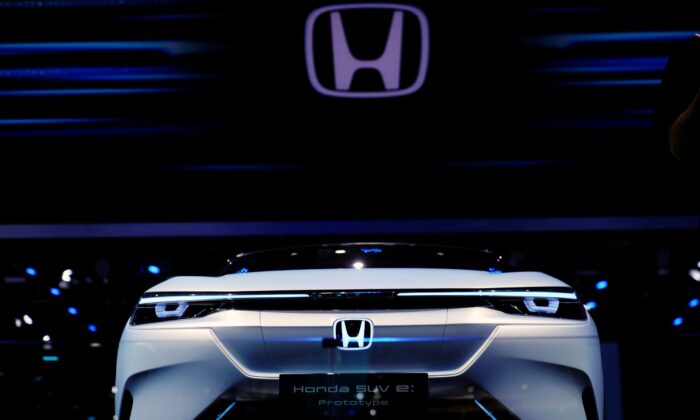Ottawa and Ontario unveil $15 billion partnership with Honda for electric vehicles
Japanese automotive giant Honda is committing $15 billion to establish a new electric vehicle (EV) battery plant in Alliston, Ontario. The announcement was made on April 25 by Prime Minister Justin Trudeau, Ontario Premier Doug Ford, and several Honda executives.
The federal government plans to invest $2.5 billion in the project through the EV Supply Chain investment tax credit and the proposed Clean Technology Manufacturing investment tax credit. Ontario’s government will also contribute $2.5 billion in the form of direct and indirect incentives.
Honda Global CEO Toshihiro Mibe stated that Honda will manufacture the EVs entirely in Canada, starting from raw materials to finished vehicles, with production set to begin in 2028. Once the assembly plant is fully operational, it is estimated to produce up to 240,000 vehicles per year according to a government statement.
Mr. Mibe confirmed that Honda will be investing $15 billion in the project, emphasizing Honda’s commitment to transitioning to 100 percent battery electric and fuel cell electric vehicles by 2040.
Mr. Trudeau hailed the deal as the largest automotive agreement in Canadian history and highlighted the creation of over 1,000 manufacturing jobs as a result of the investment.
This investment is set to generate well over 1,000 high-paying manufacturing jobs and numerous construction jobs across Ontario and the country for auto parts suppliers,” he stated.
Mr. Trudeau highlighted that Canada has become the leading supplier of lithium-ion batteries, surpassing China, and stated, “Canada is internationally recognized as a provider of clean energy solutions for a carbon-neutral world.”
“This agreement is a prime example of successful collaboration between our two governments,” stated Premier Doug Ford, describing the deal as a “game-changer” for the industry.
“This is the largest automotive investment in Canadian history. It’s a significant victory for Ontario, our workforce, and all of Canada,” he emphasized.
The $15 billion investment includes the transformation of an assembly plant in Alliston to enable full-scale production of electric vehicles. The new battery plant will be the third of its kind in Ontario, with existing plants operated by Stellantis LG in Windsor and Volkswagen in St. Thomas.
Additionally, the agreement includes the establishment of two crucial battery parts facilities in Ontario responsible for manufacturing cathodes and separators. Details regarding the locations of these facilities will be announced in due course.
The Honda deal is also tied to the Electric Vehicle Supply Chain investment tax credit of 10 percent, as outlined in the 2024 federal budget. Honda will also benefit from an existing 30 percent Clean Technology Manufacturing Investment tax credit in addition to the 10 percent credit.
The deal was briefly mentioned earlier this week during a press conference with Deputy Prime Minister Chrystia Freeland in Montreal. Though the deal was not directly addressed, Ms. Freeland remarked, “Our investment tax credits play a significant role in making Canada an attractive destination for investment.”
Similar to the Volkswagen deal brokered last year by the federal government, the agreement with Honda is part of Canada’s goal to transition to selling only zero-emission electric vehicles by 2035. This initiative involves urging automakers to have at least 20 percent of their vehicles electric or plug-in hybrids by 2026, increasing to 60 percent by 2030.
Last year, the federal government secured a similar deal with German automaker Volkswagen. According to Parliamentary Budget Officer (PBO) Yves Giroux, the Volkswagen agreement is estimated to cost Canadian taxpayers around $16.3 billion in total.
Mr. Giroux outlined that Ottawa will likely spend $12.8 billion on federal production support, $700 million through the Strategic Innovation Fund, and an additional $2.8 billion in tax adjustments as part of the Volkswagen deal.
The federal government’s objective to exclusively promote zero-emission electric vehicles in Canada by 2035 has sparked criticism, with Alberta Premier Danielle Smith contending that the regulations are “unconstitutional” and pledging to challenge their implementation in Alberta.
Ms. Smith expressed support for Albertans who wish to drive low or zero-emission vehicles but added, “These efforts should be driven by and cater to consumers and businesses, and the federal government lacks legal or moral authority to dictate which vehicles Albertans can or cannot purchase.”
Despite billions of dollars in public investments by the federal government, interest in buying electric vehicles declined in Canada last year, with consumers showing less intent to purchase an EV compared to the previous year.
A report released in November last year based on the 2023 Consumer Reports’ reliability survey in the United States indicated that EVs have 79 percent more problems than gasoline-powered vehicles, while hybrids experienced 146 percent more issues.
The Canadian Press contributed to this report.





